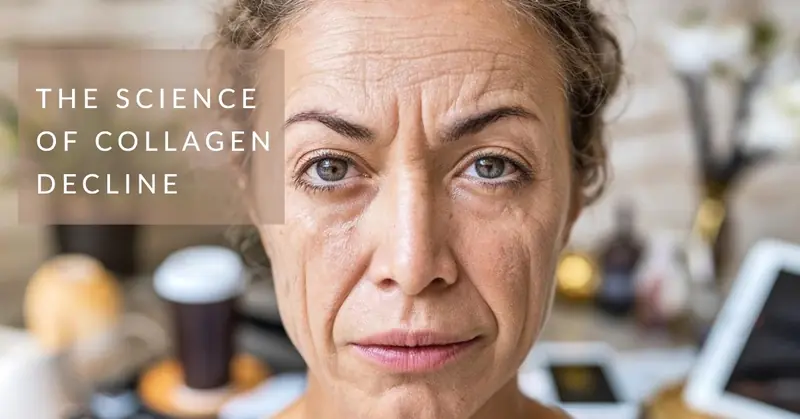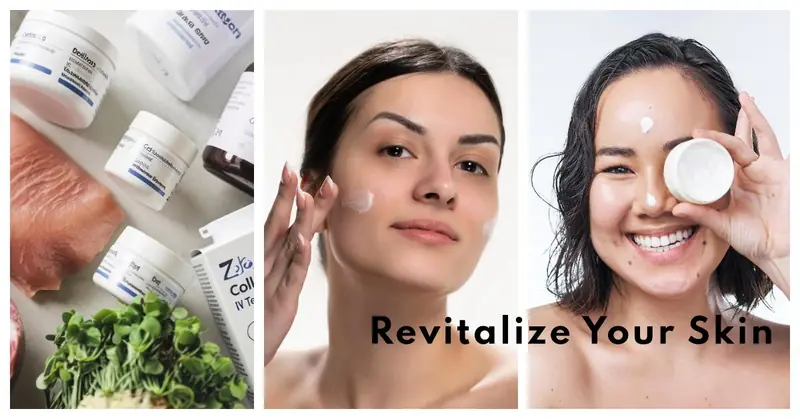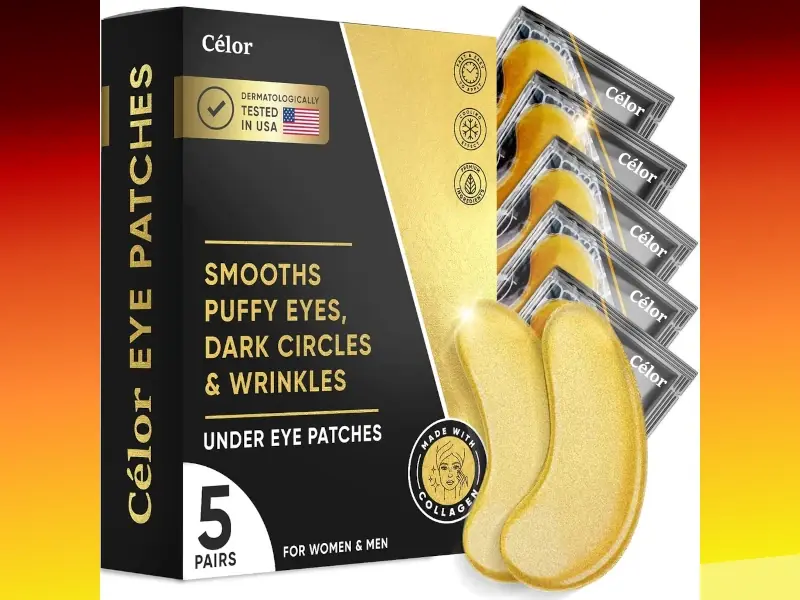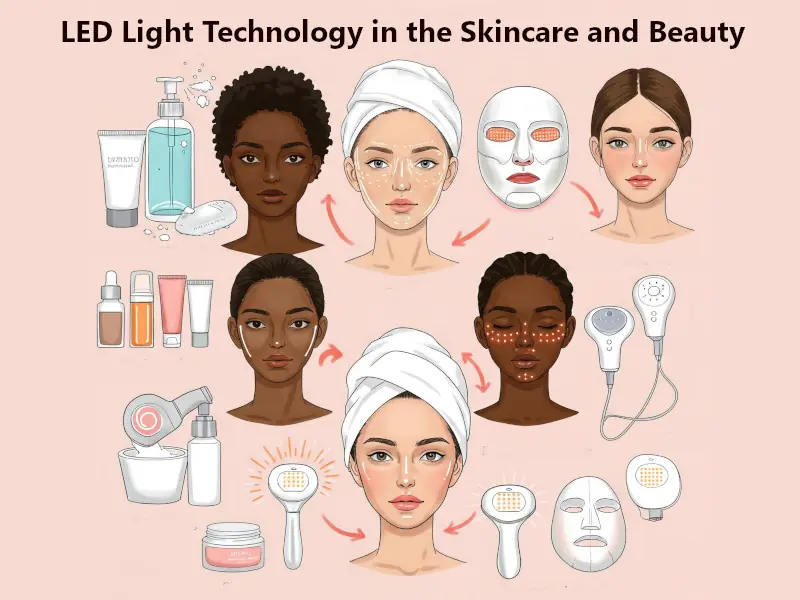Unlock the secrets of collagen and impact on skin’s health and beauty

Collagen for skin is an important topic to learn how to maintain your youthfulness. Collagen, often referred to as the “building block of skin,” is a vital protein that plays a key role in maintaining skin elasticity, firmness, and overall youthfulness. As we age, our natural collagen production slows down, contributing to the appearance of wrinkles, sagging, and dullness.
However, by understanding the power of collagen, its various types, and how to incorporate it into your skincare and lifestyle routine, you can effectively combat the signs of aging and achieve a radiant, glowing complexion.
What is Collagen?
Collagen is the Backbone of Skin Structure. Collagen is the most abundant protein in the human body, making up about 30% of its total protein content. It provides structural support and strength to various tissues, including skin, bones, tendons, and ligaments.
In the skin, collagen forms a fibrous network that acts like a scaffold, maintaining its shape, firmness, and elasticity. Think of it as the “glue” that holds your skin together, keeping it plump, smooth, and wrinkle-free.
The Role of Collagen in Skin Health
Collagen is vital for several aspects of skin health:
- Provides Structural Support: Collagen fibers create a dense network within the dermis (the middle layer of skin), providing strength and support. This network helps maintain skin firmness and prevents sagging.
- Maintains Skin Elasticity: Collagen fibers are flexible and allow the skin to stretch and bounce back into place. This elasticity is crucial for preventing wrinkles and fine lines.
- Promotes Hydration: Collagen helps the skin retain moisture, leading to a plump, hydrated complexion.
- Aids in Wound Healing: Collagen plays a crucial role in the skin’s natural healing process, helping to repair damaged tissue and minimize scarring.
The Science of Collagen Decline

As we age, our bodies naturally produce less collagen. This decline typically starts in our mid-20s and accelerates further in our 40s and 50s. This decrease in collagen production leads to a weakening of the skin’s structure, resulting in wrinkles, sagging, and a loss of elasticity.
Several factors can accelerate collagen breakdown and contribute to premature aging:
- Sun Exposure: UV radiation from the sun is a major culprit behind collagen damage. It breaks down collagen fibers, leading to wrinkles and sagging skin.
- Smoking: Smoking constricts blood vessels, reducing blood flow to the skin and impairing collagen production.
- Poor Diet: A diet lacking in essential nutrients can hinder collagen synthesis.
- Stress: Chronic stress can elevate cortisol levels, a hormone that breaks down collagen.
Types of Collagen
Collagen is needed for diverse functions for various needs of our skin. There are at least 28 different types of collagen identified in the human body, each with its unique structure and function. However, the most prevalent types found in the skin are:
- Type I Collagen: This is the most abundant type of collagen in the body, accounting for about 80% of the skin’s collagen content. It provides structural support and tensile strength to the skin.
- Type III Collagen: This type of collagen is often found alongside type I collagen and is essential for skin elasticity and suppleness.
- Type V Collagen: While present in smaller amounts, type V collagen plays a vital role in regulating the assembly of other collagen types, contributing to the skin’s overall structure and organization.
| Collagen Type | Function | Location |
|---|---|---|
| Type I | Provides structural support and tensile strength | Skin, bones, tendons, ligaments |
| Type III | Contributes to skin elasticity and suppleness | Skin, blood vessels, internal organs |
| Type V | Regulates the assembly of other collagen types | Skin, hair, placenta |
Boosting Collagen for Radiant Skin

What are the strategies to enhance your skin’s youthfulness? While the natural decline in collagen production is inevitable, there are several ways you can support and boost your skin’s collagen levels, helping to maintain a youthful and vibrant complexion.
1. Dietary Sources of Collagen
It is nourishing your skin from within. Incorporating collagen-rich foods into your diet can provide your body with the building blocks it needs to produce more collagen. Consider adding these foods to your meals:
- Bone Broth: Made by simmering animal bones, bone broth is a rich source of collagen and other beneficial nutrients like amino acids and minerals.
- Fish with Skin: The skin of fish like salmon and cod contains collagen.
- Chicken with Skin: Chicken skin, especially from the neck and wings, is another source of collagen.
- Egg Whites: Egg whites contain proline, an amino acid essential for collagen production.
- Citrus Fruits: Citrus fruits like oranges and grapefruits are rich in vitamin C, which is crucial for collagen synthesis.
- Berries: Berries are packed with antioxidants that protect collagen from damage.
- Leafy Green Vegetables: Leafy greens like spinach and kale contain vitamin C and other nutrients that support collagen production.
- Nuts and Seeds: Nuts and seeds provide zinc and copper, minerals that are essential for collagen synthesis.
2. Collagen Supplements
A convenient way to boost your skin. Collagen supplements are available in powder, capsule, or liquid form, offering a convenient way to increase your collagen intake. Look for hydrolyzed collagen or collagen peptides, which are broken down into smaller molecules for better absorption.
Studies have shown that taking collagen supplements can lead to:
- Improved Skin Elasticity: Several studies have demonstrated that oral collagen supplementation can improve skin elasticity and hydration, reducing the appearance of wrinkles and fine lines.
- Reduced Joint Pain: Collagen supplements may also benefit joint health by promoting cartilage regeneration and reducing inflammation.
When choosing a collagen supplement, consider the following factors:
- Type of Collagen: Look for supplements containing type I and III collagen, which are the most beneficial for skin health.
- Source: Collagen supplements can be derived from bovine, marine, or porcine sources. Choose a source that aligns with your dietary preferences and restrictions.
- Dosage: The recommended dosage varies depending on the specific product and your individual needs. Consult with a healthcare professional to determine the appropriate dosage for you.
- Quality: Choose a reputable brand that uses high-quality ingredients and adheres to good manufacturing practices.
Our recommendations:
💊 ForestLeaf Multi Collagen Pills – Beauty & Mobility from Within
Give your body a daily boost of essential proteins with ForestLeaf Multi Collagen Pills — designed to support your natural beauty and physical strength.
✨ Radiant Skin, Hair & Nails
Boost elasticity for healthier-looking skin while promoting stronger hair and faster nail growth.
🦴 Stronger Bones & Flexible Joints
Support bone density and joint flexibility to improve mobility and reduce the risk of fractures.
🧴 Youthful Glow
Minimize fine lines, wrinkles, and stretch marks by helping your skin retain moisture and firmness.
🌿 Tight, Smooth Skin
With connective tissue support, this collagen blend helps smooth cellulite and gives your skin a firmer, more toned appearance
3. Topical Collagen Products
The process of supporting skin health from the outside. While topical collagen application has its limitations due to the large size of collagen molecules, certain products can still offer benefits for skin health and collagen production:
- Retinol: This vitamin A derivative stimulates collagen production and improves skin texture. It’s considered one of the most effective anti-aging ingredients available.
- Vitamin C: A potent antioxidant that protects collagen from damage and promotes its synthesis. It also helps brighten the skin and even out skin tone.
- Peptides: Short chains of amino acids that can signal the skin to produce more collagen. Peptides can also improve skin hydration and firmness.
When choosing topical collagen products, look for those containing:
- Hydrolyzed Collagen: This form of collagen is broken down into smaller peptides, making it easier for the skin to absorb.
- Collagen-Boosting Ingredients: Ingredients such as retinol, vitamin C, and peptides can help stimulate collagen production and amplify the benefits of topical collagen.
4. Professional Treatments
These are advanced solutions for collagen stimulation. If you’re looking for more intensive results or to address specific concerns, consider these professional treatments that can effectively stimulate collagen production and improve skin elasticity:
- Microneedling: This minimally invasive procedure creates tiny punctures in the skin using fine needles, triggering the skin’s natural healing process and promoting the production of collagen and elastin. Microneedling can improve skin texture, reduce scarring, and minimize the appearance of wrinkles.
- Laser Therapy: Laser treatments use focused light energy to target and heat the deeper layers of the skin, stimulating collagen production and tightening the skin. Different types of lasers can address various skin concerns, including wrinkles, fine lines, and sun damage.
- Radiofrequency Treatments: Radiofrequency energy heats the deeper layers of the skin, promoting collagen remodeling and tightening. This non-invasive treatment can improve skin laxity and reduce the appearance of wrinkles.
5. Lifestyle Changes
Your healthy habits for a youthful complexion. In addition to skincare and professional treatments, adopting healthy lifestyle habits can significantly impact your skin’s collagen levels and overall health:
- Sun Protection: Protect your skin from the sun’s harmful rays by wearing sunscreen with a broad-spectrum SPF of at least 30 every day, even on cloudy days. Seek shade during peak sun hours and wear protective clothing like hats and sunglasses.
- Quit Smoking: Smoking damages collagen and elastin, accelerating skin aging. Quitting smoking can significantly improve your skin’s health and appearance.
- Manage Stress: Practice stress-management techniques like yoga, meditation, or deep breathing exercises to reduce cortisol levels and protect collagen.
- Get Enough Sleep: Aim for 7-8 hours of quality sleep each night to allow your body to repair and regenerate, including your skin.
Incorporating Collagen into Your Routine
It is nothing but the practical tips for a collagen-rich lifestyle. Here are some practical tips for incorporating collagen into your daily life and reaping its benefits for your skin:

Diet: Include collagen-rich foods in your diet regularly. You can add bone broth to soups and stews, enjoy fish and chicken with the skin on, and incorporate egg whites, citrus fruits, berries, leafy greens, and nuts into your meals and snacks.
Supplements: If you’re not getting enough collagen from your diet, consider taking a collagen supplement. Choose a high-quality product from a reputable brand and follow the recommended dosage. Look for supplements that contain hydrolyzed collagen or collagen peptides for better absorption.
Topical Products: Incorporating Collagen into Your Routine. Incorporate topical products containing retinol, vitamin C, and peptides into your skincare routine. These ingredients can help stimulate collagen production and enhance the benefits of topical collagen. Look for products that specifically mention collagen-boosting properties or contain hydrolyzed collagen.
Professional Treatments: If you’re looking for more dramatic results or to address specific concerns, consider professional treatments like microneedling, laser therapy, or radiofrequency treatments. Consult a dermatologist or licensed esthetician to discuss your options and determine the best treatment plan for your needs.
Lifestyle Changes: Adopt healthy lifestyle habits to support your skin’s collagen levels and overall health:-
- Protect your skin from the sun’s harmful rays by wearing sunscreen, seeking shade, and wearing protective clothing.
- Quit smoking to prevent collagen damage and premature aging.
- Manage stress through relaxation techniques like yoga, meditation, or deep breathing exercises.
- Get enough sleep to allow your body to repair and regenerate, including your skin.
Conclusion
Collagen is a vital protein that plays a key role in maintaining skin health, elasticity, and youthful appearance. As we age, our body’s natural collagen production declines, leading to wrinkles, sagging skin, and a loss of firmness. However, by understanding the benefits of collagen, its various types, and how to incorporate it into your routine through diet, supplements, topical products, and professional treatments, you can combat the signs of aging and achieve a radiant, youthful complexion.
Remember, consistency is key. Make collagen a priority in your skincare and lifestyle choices, and your skin will thank you with a glowing, vibrant appearance for years to come.
Source:
Frequently Asked Questions (FAQs) About Collagen for Skin
Remember, the journey to healthy, youthful skin is a continuous one. By prioritizing collagen and adopting a holistic approach to skincare, you can achieve a radiant, glowing complexion that defies the signs of aging.
Trust in your purchase:
Every product featured on our site has been carefully researched and selected based on quality, customer ratings, and positive reviews to ensure you receive excellent value for your money.
Please note:
This post contains affiliate links. If you make a purchase through these links, we may earn a small commission at no additional cost to you. This helps support our site and allows us to continue bringing you valuable content. Thank you!
Thank you for your precious time spent with AestheticThrive.






